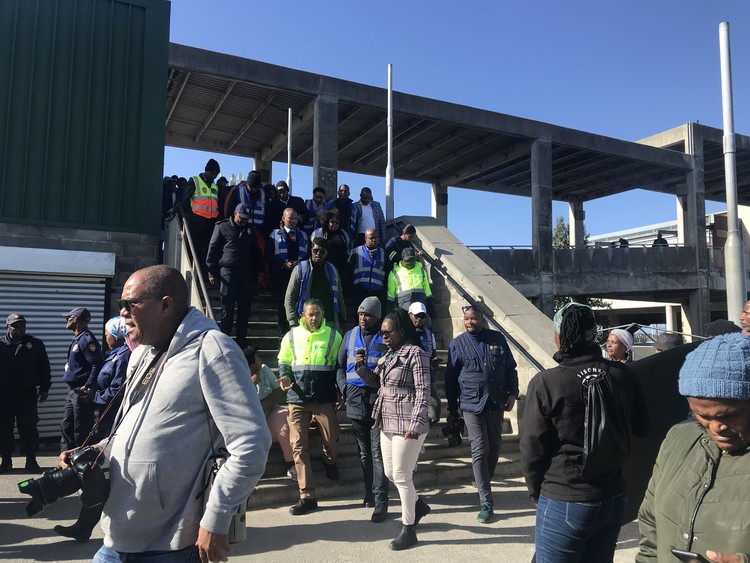
5 July 2023
Members of Parliament’s Standing Committee on Public Accounts (SCOPA) with a delegation from PRASA inspect conditions at the Philippi train station on Tuesday. Photos: Tariro Washinyira
The Central Line service between Nyanga, Chris Hani, Khayelitsha and Mitchells Plain in Cape Town will be running before the end of March next year, according to the Passenger Rail Agency of South Africa (PRASA).
PRASA CEO Hishaam Emeran told MPs during a visit on Tuesday to see train infrastructure along the line that Chris Hani station in Khayelitsha and where the track was being upgraded and repaired. He said the aim was for the service to run by the end of March, but shack dwellers needed to be relocated.
In March PRASA partially resumed services on the Central Line, which had been closed since 2019. Trains are running only from Nyanga to Maitland. Philippi station has been severely damaged and vandalised. The whole building including the ticket offices needs a lot of work. There are holes in the floor and ticket offices windows and doors have been removed.
Parliament’s Standing Committee on Public Accounts (SCOPA) chair Mkhuleko Hlengwa said progress on the line was far outweighed by the challenges.
He said following the decision by the previous PRASA board to cancel the security contract there had been vandalism and destruction of property on the line.
MPs have previously described the decision to cancel the contract as irresponsible. Hlengwa said the previous directors should not just “walk away scot-free” and continue to be directors elsewhere.
PRASA told MPs that this section with overgrown shrubbery and shacks on the tracks at Govan Mbeki bridge would have to be completely rebuilt.
Hlengwa said the committee would be back in January 2024 to check if PRASA fulfils its duties.
He complained that there had been no progress in relocating the families living along the line.
“Money has been made available but still there has been no progress in the relocation process. It’s our assessment that there is a lack of political will and lack of collaboration and lack of teamwork.”
Emeran said at Govan Mbeki bridge, where shacks have been built on the railway reserve, the railway line would have to be completely rebuilt.
Acting regional manager of PRASA Moseli Ntsiki said 1,254 shacks at Siyahlala informal settlement near Langa station would need to be relocated. He said the eviction order, which had been changed three times, would lapse at the end of November, and the challenge was getting everyone to sign the social compact.
Regional engineering manager Raymond Maseko said trains in the area were running slowly so as to reduce the risk of people getting hurt. “The final solution must come so that we can have children protected from moving trains. At the moment from the station all the way to the bridge [in Siyahlala] we are travelling at 15km per hour.”
On Wednesday in Parliament, the committee will discuss the relocation of residents of the informal settlements on the railway line in Khayelitsha, Philippi and Langa, with representatives from PRASA, the City of Cape Town, Department of Human Settlements, National Development Agency and the Department of Public works and Infrastructure to discuss the relocation of informal settlement communities.
Hlengwa told the PRASA executives not to come to the meeting with a “them and us” attitude. “You are all components of the state and government’s mission, cooperation has to be demonstrated by yourselves because ultimately you need each other. There have been disjointed interventions pulling in different directions, lack of coordination. So go polish and clean up everything because tomorrow you are coming there as a team.
“You have to find each other and there has to be coherence. We want this resolved by everybody. All we want is a lasting solution.”
He said many people, including poor people and students, depended on a functional PRASA.
The buildings at the Philippi train station are badly vandalised.